Interest in Europe has grown stronger in 2022, even after a summer saw crowds of Americans returning to their favorite countries after the COVID shutdown, according to our most recent Luxury Travel Advisor Affluent Sentiment Survey. In fact, nearly 73 percent of luxury travel advisors surveyed said their clients’ interest in returning to Europe next year had grown since the beginning of the year.
And, so, it was no surprise when we gathered executives from tourism offices and hotel companies for a roundtable in our Manhattan offices to hear that business was back stronger than ever and shows no sign of abating.
Joining us were: Michael Gigl, head of market, USA, Austria Tourism Board; Carey Duckworth, head of global sales and Simona Maniaci, director of global sales, East Coast, USA, Corinthia Hotels; Ricarda Lindner, regional manager, The Americas, German National Tourist Office; Shannon Knapp, president & CEO, The Leading Hotels of the World; Celina Tavares, director, USA, Portugal National Tourist Board; Paolo Lunardi, head of trade relations, North America, Switzerland Tourism; Alison Metcalfe, EVP, North America, Tourism Ireland; Jose Manuel De Juan Gonzalez, consul for tourism affairs, Turespana; Gavin Landry, EVP, Americas, Visit Britain and Vanessa Gonzalez-Hernandez, travel trade marketing manager, Visit Monaco.
The discussion covered Europe’s recovery as well as how to rebuild the tourism infrastructure in a more sustainable manner. Following is a condensed version of the conversation, which was moderated by Ruthanne Terrero, VP/editorial director of Luxury Travel Advisor.
Ruthanne Terrero, Luxury Travel Advisor: Welcome everyone! How was business from the U.S. market this summer and are you reshaping future strategies?
Michael Gigl, Head of Market, USA, Austria Tourism Board: The one aspect that surprised me was the speed of recovery. Austria was in a geographically more difficult position at the beginning of the year with the Ukraine war starting, so we did see a very abrupt slowdown in bookings early on; however, as soon as people realized that it was remaining a regional conflict, they started booking. We’ve seen a great recovery. It’s a bit ahead of what I expected. From early summer through now, we’re reaching about 80 percent of the 2019 levels, which is stronger than we expected, and every indication from partners in the industry is that it’s looking very strong.
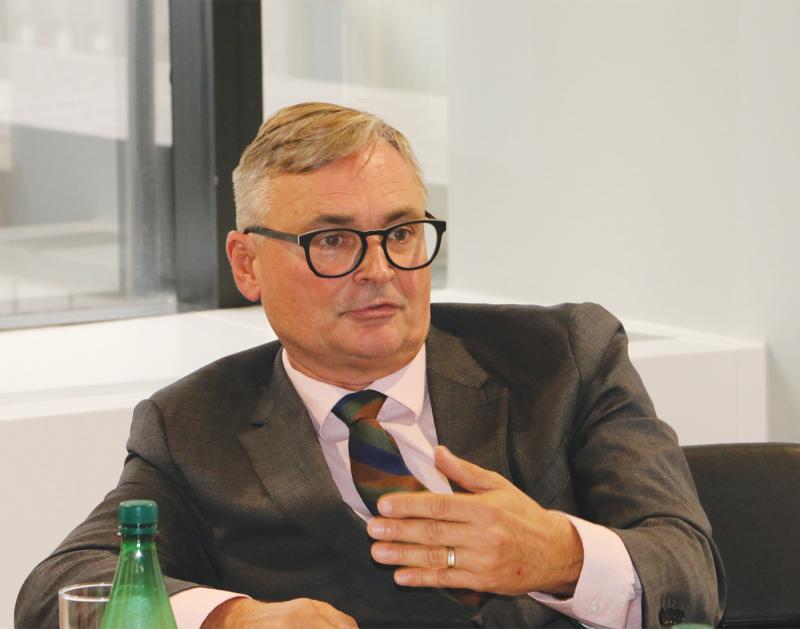
Going forward there’s a lot of uncertainty in the market in terms of the economy. But fingers crossed, I’m very optimistic.
Vanessa Gonzalez-Hernandez, Travel Trade Marketing Manager, Visit Monaco: It’s been a great year for us as well. I just came back from our annual meeting and we’re very happy to share that the U.S. market has been the top market for us. We’ve surpassed 2019 numbers. We’re excited for next year and to keep that momentum.
Celina Tavares, Director, USA, Portugal National Tourist Board: It’s the same for Portugal. The recovery that we’re seeing this year has surpassed all our expectations from all markets, but especially from the U.S. Up to August, we had over 900,000 guests and more than 2 million night stays from the U.S. market, an 18.8 percent increase in guests and 19.5 percent increase in stays when compared to 2019. Revenue-wise, we are at a 45 percent growth out of the U.S. market, up to August 2022, vs. 2019.
Ricarda Lindner, Regional Manager, The Americas, German National Tourist Office: I’m echoing everything that my colleagues have said. In Germany, we had a bit of an artificial boost this year from the Oberammergau Passion Play, which is always extraordinary for Germany. Our colleagues around the table that neighbor Germany are also getting a little bit of benefit from the Passion Play.
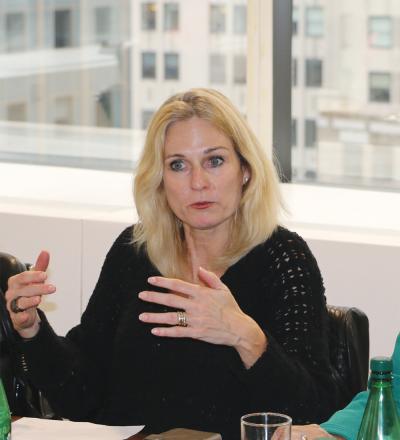
We are very optimistic about the numbers for this year. We’re discussing how much we actually want to beat the 2019 numbers and if this is really the right goal that we should be looking at. From an industry perspective, airlift will have recovered to almost 100 percent by the end of this year, which is much more than we expected. We’ve also got good pent-up demand and the good exchange rate, which is in our favor right now.
Leading into 2023, we’re looking at how we want to build back the industry; how will the industry be able to deal with staffing issues that we’re having on either side of the Atlantic and how can we do all this in a more sustainable manner.
Alison Metcalfe, EVP, North America, Tourism Ireland: What surprised us was the speed of the recovery, which was fueled to a large extent by huge pent-up demand, the deferred bookings, and also those banked vacation dollars. It was all very strong for us. And being an island, air access is really important to Ireland, and we had a really swift restoration of air access. We got back to 89 percent of the peak summer capacity that we had in 2019, so we had 13 gateways versus the 16. As we head into the fall and into next year, we’ll be back to 100 percent.
We saw people willing to spend a bit more and stay a bit longer because they’d been cooped up at home. They were willing to invest in unique, immersive experiences. There’s been a lot of work going on on the ground within our industry to improve and to add to experiences. We also saw an increase in private rentals. We saw a big growth in multi-generational travel, which I think a lot of European destinations have seen.
So, as Ricarda said, as we move now into 2023, this year was about just restarting, and we’re moving into what we call the “rebuild phase” of our recovery strategy. The focus will be back on revenue as opposed to volume. Sustainability will underpin everything we do, economically, socially and environmentally. So, it will be a slightly different approach as we head into 2023, but all things considered, we’re pretty happy with where we’re going to net out this year.
Shannon Knapp, President & CEO, The Leading Hotels of the World: I certainly echo the trends that you’ve shared. From a Leading Hotels perspective, we are on track for a record revenue year this year. We are 100 percent over last year. We are 15 percent ahead of 2019. So, it’s really been an extraordinary, resilient, rapid, and in some ways, aggressive recovery, which is fantastic. I think the consideration is around what is the right pace of growth.
This is the last time in 2022 that I will reference 2019 in terms of the benchmark. I don’t think we should be looking backwards, but we all needed some anchor to figure out are things back to normal, to some extent.
Going forward, the industry will be very different for a variety of reasons. As I look at 2022, what wasn’t surprising was the international travel demand. On the luxury side, we knew our customers were dying to go to Europe. We knew that the U.S.-to-Europe traveler would do quite well.
What was surprising was the European travelers. We expected them to really not travel within Europe as much, and that has not been the case. So, you have the return of the international traveler to Europe, and then you have domestic regional travel still growing in a rapid clip, 50 percent year over year. So, the benefit, I think, for our members in seeing both of those key segments grow has been the main driver of the recovery.
When you layer in the challenges with labor and you layer in the cost of energy, etc., it’s an interesting problem to have.
Gavin Landry, EVP, Americas, Visit Britain: From Britain’s perspective, we too have been seeing some very positive results. North America in particular has just eclipsed 2019 numbers, and I like your idea of not referencing that year anymore. But when you think about 2019, we had 4.5 million inbound visitors from the U.S. and just under 900,000 from Canada. The U.S. is the top inbound source market for Britain and represents about 10 or 11 percent of the total tourism spend from inbound tourism, so it’s a really important market. We have come out of the recovery or have been dealing with the recovery as a main priority, thinking about sustainability as well.
We are also thinking about how we can approach high-net-worth individuals that have the time and the money to travel.
We think that there’s an opportunity for us to reshape the industry, to think about revenue first as opposed to volume, and align with what’s going on in the world.
Paolo Lunardi, Head of Trade Relations, North America, Switzerland Tourism: We also had a very fast rebound. In June and July we were pretty much level with what we had in 2019, and in August, we had plus 3.2 percent, so that’s definitely a good sign.
What also surprised us was the amount of people who chose to travel by train. Trains have always been a major USP for Switzerland, but we were positively surprised about that, and also about the fact that they’re really ready to pay whatever it takes to get that specific activity, especially in the luxury segment. In the future we want to focus more on authentic and one-of-a-kind experiences.
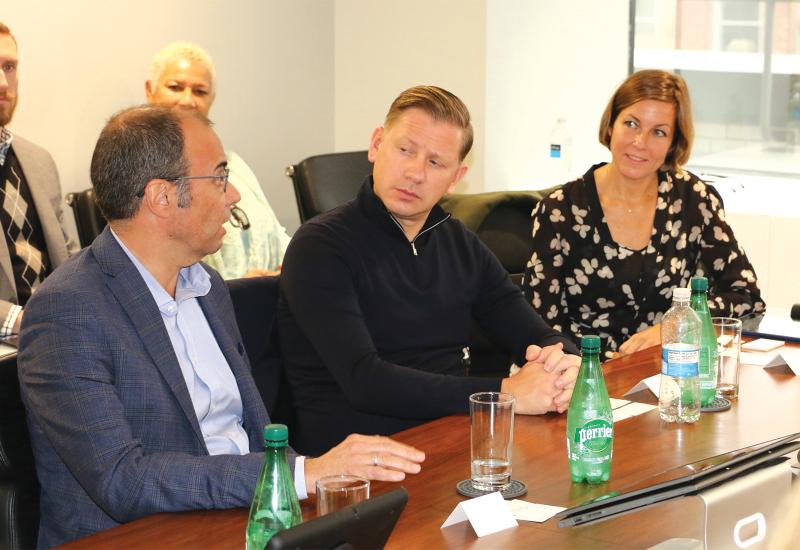
Jose Manuel De Juan Gonzalez, Consul for Tourism Affairs, Turespana: We were surprised at the speedy recovery. The summer was really good from the U.S. From May to the end of August we had 97 percent of the tour nights we had in 2019 but with fewer people. It was 87 percent of visitors, but they stayed longer and they spent more. They wanted higher quality products. They stayed in higher quality hotels, they used the higher-priced services, etc.
We don’t know if that’s a trend that’s going to stay, but we are focusing on rebuilding our tourist products so that they are more sustainable. Everything will be sustainable, either socially, economically and definitely environmentally. So, we are now putting all our efforts into investing in the products in the destinations, so that in a couple of years, we can say all the products in Spain are sustainable. What we want now are people who want to enjoy those sustainable products.
Carey Duckworth, Head of Global Sales, Corinthia Hotels: From our perspective, it’s very different by country and by market, and certainly by market segmentation. The corporate market recovery has been a lot slower from the major blue-chip companies than we expected. You have buyers and senior purchasing directors who are saying, “I’ve saved on this travel by not putting 15 people on the road this week, but my tech cost has gone up.” So, we’re navigating that at the moment.
Our leisure market has been particularly strong and our corporate group market in the U.S., which is a longer lead, is building stronger. In the U.K. at the moment, we’ve not had the stability we would hope. So, I’m hoping now that we’ll have a bit of stability because we need that from the U.K. perspective.
Next year is going to be exciting for us as a brand. We open in New York, Rome and Bucharest. Our business model is leading more toward the higher-end leisure market.
Labor across our whole industry is a challenge at the moment. So, I think that’s going to really impact what we do and our profitability.
Ruthanne Terrero, Luxury Travel Advisor: Where’s the New York hotel going to be?
Carey Duckworth, Head of Global Sales, Corinthia Hotels: It’s on Madison and 76th. It’s the old Surrey.
Simona Maniaci, Director of Global Sales, East Coast USA, Corinthia Hotels: That’s our first North American hotel, it’s very exciting.
From a brand perspective, Lisbon is very popular, but we’ve also been seeing requests for Malta because travelers were looking for alternatives with some of our most popular European destinations being overcrowded. We’re seeing multi-generational travel and people buying up the suites. That’s been really good for us as well because we have beautiful suite products.
Ruthanne Terrero, Luxury Travel Advisor: How are you looking at 2023 and beyond?
Vanessa Gonzalez-Hernandez, Visit Monaco: The biggest thing that we analyzed during our annual meeting was the fact that our connectivity has been important for us, especially because Monaco does not have an international airport. We rely on Nice. So, when United Airlines, for instance, rolled out direct service from New York to Nice, that was major for us. We partnered with them and did a whole campaign to build up the awareness of Monaco, so people know that when they reach Nice, they are just 35 minutes away from Monaco.
We also discussed the fact that during COVID, people were traveling to destinations that were open, like the Caribbean. So, when they started seeing that Europe was opening and the pricing was similar to what it was now costing to go to the Caribbean, we knew that when they priced out things they would choose to go to Europe.
Multi-generational travel is also big. People during COVID spent most of their time with their families, and that put everything into perspective. They now want to travel with family and close friends.
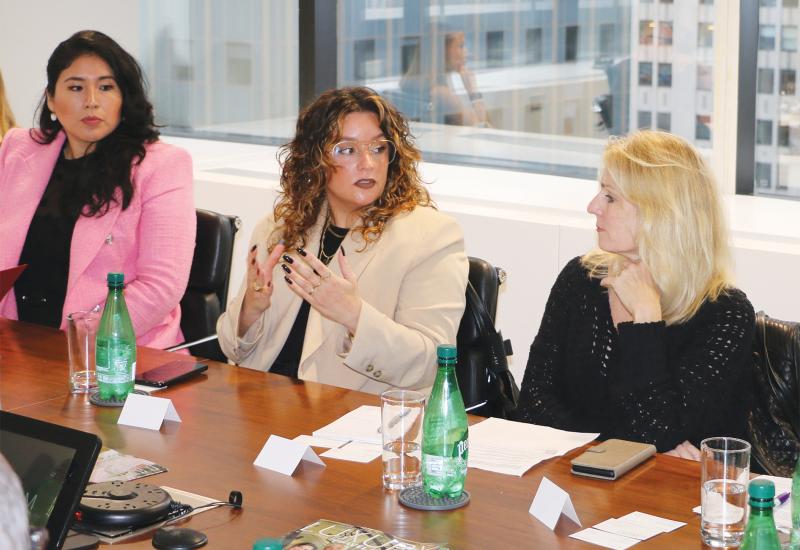
Ricarda Lindner, German National Tourist Office: I don’t think multi-generational travel came out of COVID. The research that we have done during and after COVID, shows that everybody seems to be inching back to where we were before. Yes, they’re spending a little bit more, staying a little longer and they’re looking for more exclusive activities, but we also route that back to the fact that they had all these travel savings for two years. With the stock market and inflation the way they are going, we assume that this will also go back a little bit to normality of where it was.
During COVID, we saw a concentration in mono-destination travel, to just one country. Americans are now combining European countries again. I think it’s all inching back and COVID has almost been an afterthought. That’s why it’s even more important for us to actively shape the new landscape that we’re in and question what we want to do. At the same time, our destinations have stayed the same. Eighty percent of travelers go to cities, and they will return to the cities because that’s our USP. London will always be London and Berlin will always be Berlin.
Shannon Knapp, The Leading Hotels of the World: We’re seeing that, but we’re seeing 100 percent increase year over year in travel to the major cities of Europe, but not necessarily at the expense of other areas. But to your point, London will always be London, Berlin will always Berlin, Dublin will always be Dublin. And American travelers, especially the luxury travelers, want to go back there.
I think many of you have referenced this as well, this concept of trading up. We suspected it was a uniquely COVID experience because people wanted space, they wanted privacy. But we are seeing that trend continue, so our mix of suites and villas versus regular rooms is up 36 percent from ’19. Our ADR is up 40 percent and that’s incredible.
We were having a conversation before about just how far can ADR go? I expect there will be some kind of slow down, but right now we’re more than percent ahead on booked business.
Alison Metcalfe, Tourism Ireland: To your point the luxury segment seems pretty resilient going into 2023. The big question’s going to be now what impact some of these economic headwinds are going to have on the labor market. We’re getting feedback in that regard. But having said that, many of us are dialing up our focus on revenue and on luxury. The U.S. market is where the action is in terms of the luxury market to Europe.
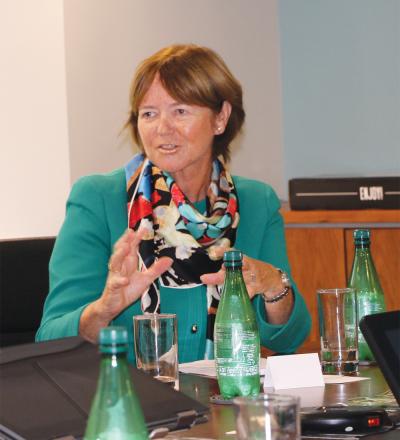
As Ricarda said, a lot of those trends were there before COVID, they’ve just been accentuated. During COVID they wanted the great outdoors. They didn’t want cities. They still want the great outdoors, but to your point, they’ve gone back to their old behaviors. It’s all about the local and authentic experience. Those are overused words but I think people still really want to get under the skin of a destination. They want to learn something. They want to connect with local people and with the landscape.
We’ve also seen a big increase in consumers taking a private car and driver, a private driver guide. Our latest wave of COVID research shows that even if people are going to be impacted by some of the economic headwinds, they’re willing to make trade-offs to maintain travel within their lifestyles.
We conducted research in September; seven out of 10 Americans planning to travel internationally haven’t decided where they’re going yet. So, there’s a big opportunity for destinations around the table.
Gavin Landry, Visit Britain: We’re thinking about the work-from-anywhere phenomenon, digital nomads. From North America there’s a lot of opportunity for the future.
We’re also focussing on how to diversify our offering. How do we diversify our travelers? America will be a minority/majority country in a few years. We want to appeal to as many of those new travelers who haven’t experienced Great Britain, whether it’s among people of color or members of the LGBTQ community. We want to diversify and to be part of that trend, which is becoming more and more of an irresistible force, just like sustainability.
Michael Gigl, Austria Tourism Board: I think everyone across this room has talked about luxury and about a focus on revenue. Is there still a mid-market, especially going forward into possible economic uncertainty?
I remember the good old days when travel to Europe was a middle-class adventure. I think that, for the time being, is almost over. The question is, is there going to be a middle class in this country? That’s a bigger debate to be had.
As for diversity, it used to be that the majority of this country had a cultural connection to Europe that was automatic. That’s no longer the case. We see tremendous growth in Asian-Americans traveling, for example. So, [instead,] it’s about the mindset. It’s about interests. We talk about that more and more. This is also the first time we have four generations traveling internationally. It used to be retired people. But now you have Gen Z all the way to the still-kicking Baby Boomers. That doesn’t make our lives in terms of marketing and communications easier because you’ve got to be on so many different platforms. But to me, it’s exciting. It’s really a different marketplace out there.
Ricarda Lindner, German National Tourist Office: But can I ask a question? We talk about the luxury traveler, and in Germany, we are breathing sustainability, our entire spectrum and product revolves around it. If I talk about the high-net-worth client that, by definition, is the one that pollutes more because of the private planes, the private cars, all of that. So, there is an inherent contradiction in sustainability and having the high-net-worth client as a target group.
For us it’s like, do we go for the low-hanging fruit right now because they’re more likely to travel and more likely to spend? Absolutely. Is that the right target group moving forward to go after? That is something that we’re struggling with.
Michael Gigl, Austria Tourism Board: They consume more, but on the other hand you need fewer of them to bring the economic benefit to the destination. That’s the other side of the coin. I think the market is growing because there are more people moving into this luxury set, otherwise, it would be stagnant. It might be the middle class is disappearing or becoming less interested in international affairs.
Celina Tavares, Portugal National Tourist Board: A lot of the work that we also do as a National Tourist Board is educating our local suppliers that they need to have different policies, not only regarding sustainability but also looking to differentiate their source markets. Portugal was very focused on European markets, which are more mass volume to the destination. In the past four to five years, we’ve been looking to consolidate our positioning as a high-end destination, as an axis to dynamize our tourism offer and infrastructure, but also the visitors’ experience. This is possible not within the spectrum of the more generalized demand to our destination (culture, history, and gastronomy), but also through niches such as golf, wellness, surfing, walking, and cycling, wine tourism and weddings and honeymoons.
Another priority is to promote responsible tourism and reinforce the perception of Portugal as a sustainable destination. Our Sustainable Tourism Plan 20-23, which involves all the players in the sector, foresees about 70 initiatives and projects that are being developed with the national tourism actors towards a “greener” conscience. It also reinforces the commitment of all social agents involved towards our three pillars of sustainability: economic, environmental and social.

of the World (Luxury Travel Advisor)
Shannon Knapp, Leading Hotels of the World: We’re seeing an increase in willingness to pay more for sustainable travel. There is a demand from our travelers that our hotels have some bare minimum sustainability guidelines and principles, and that they are endeavoring to be responsible global citizens. I can tell you that in a recent LHW survey 20 percent of our guests stated they have booked a more expensive hotel because it had better sustainability practices.
Jose Manuel De Juan Gonzalez, Turespana: I think it’s too late now to ask if people are willing to pay more or not. We need to have the product and it’s our job as the destination to show them this is the product and it is sustainable. I think it’s the national governments that have to push that. You have to invest in that because, in the end, that’s the product that you need to sell. So, even if consumers are not demanding it right now, we have to do it because if not, it will be too late. We cannot wait until the demand is there.
Alison Metcalfe, Tourism Ireland: I think all travelers want to feel that even when they’re traveling, the impact of their visit is a positive one. That’s something that we as DMOs and businesses can facilitate. It’s both the economic impact, but it’s also the social, and the environmental and the community impact.
As we come out of COVID as part of recovery, our priority focus is to make sure we’ve got businesses that are economically sustainable.
There is a need for greater collaboration between ourselves and our national development agencies and our respective countries, and also the policymakers to ensure that we have great public transportation networks. We have to have some kind of accreditation for [sustainable] tourism businesses that’s recognizable. That kind of work is underway, but I think we’re on a journey.
I know from our own research there is a bit of a gap between people recognizing that they want to have a positive impact and that they are interested in sustainable products, but are they willing to pay for it, if it means a slightly less comfortable experience? It’s incumbent upon us to say, “Okay, how can we almost give them the gift of sustainability?” Because we’ve all got sustainable travel experiences in our destinations, biking trails, hiking and cycling and we’re all offering local experiences around food. How do we package it and put it together in the meantime?
There’s a lot of work to be done and I think we’re all fearful that we don’t get into that greenwashing space, and certainly that we see it as being on a journey.
Michael Gigl, Austria Tourism Board: I do see change in the behavior of travelers within Europe, and that’s influenced Americans when they travel. In Austria, I’ve never seen railcars as full as they are now. Every train is booked out. Austrian Railway is putting a lot of money into upgrading overnight trains to Europe. So, I think rail travel is replacing short haul air travel within Europe.
I’m curious, especially with the remote work trend, if Americans will start traveling for longer durations again. Are they going to do what the Australians do when they travel to Europe and stay for three weeks instead of that three-night shopping trip to London?
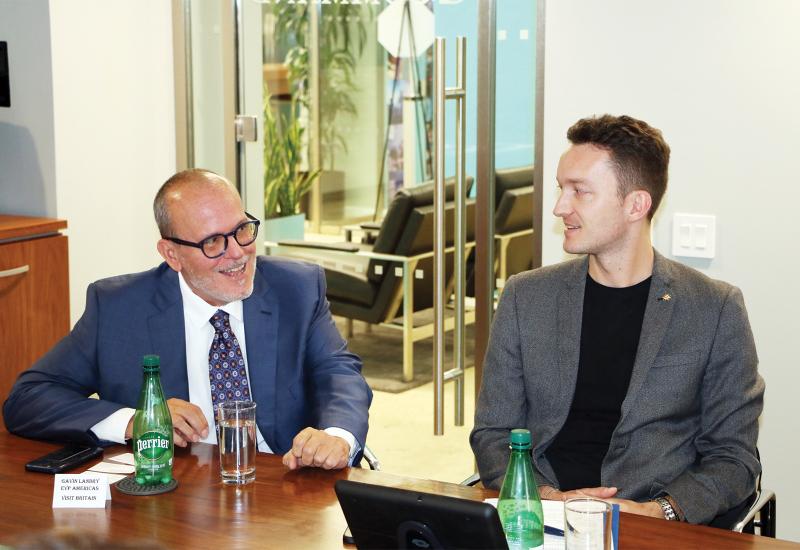
Gavin Landry, Visit Britain: Amazon was getting pushback on coming back to the office, so it set a policy where you can work from anywhere for two weeks a year. So, you do have to come in the office, but you can travel and do two weeks from anywhere.
On the topic of sustainability, Ricarda, I think you’re absolutely right, but this does feel like an irresistible force. I sit on the advisory board for Expedia, and they’ve just hired a chief sustainability officer. Now if you have the likes of Expedia who have 60 million Americans in their database that they work with, you’re talking about a major player in the industry that now has the suppliers [practicing sustainability]. Those who are not at the party are going to be left behind.
Ricarda Lindner, German National Tourist Office: But keep in mind, that is driven by private equity and by the financial markets, not by the consumer. Every company that doesn’t have a solid sustainability program will not get the same interest; they will not get the same money.
Carey Duckworth, Corinthia Hotels: In the hotel space, until there’s a uniform approach, the sustainability message is going to be different, whether you stay with us in London or you go to the Four Seasons. Everyone’s trying to work towards sustainability, but everyone’s got their own idea of what it is.
There are more air routes coming into London. The biggest problem is the construction of the aircraft, not the people that are flying in it.
Paolo Lunardi, Switzerland Tourism: I agree that sustainability messaging should come from us and our suppliers in the destination. That was one of our major goals when we launched the sustainability strategy (which we like to call a movement rather than strategy) called Swisstainable. Switzerland has a long history of being a sustainable country, Swisstainable is very much a level of commitment that we require from our tourism suppliers (hotels and mono-railways, restaurants, etc.). The goal is to have everyone be part of Swisstainable with either a level one, level two or level three commitment. To expand this strategy further, we also work with tour operators, for example, to launch new sustainable packages. We now have multi-year global agreements with Kuoni Tumlare and TTC where we tackle several key markets with new products that feature sustainable travel. Basically, all suppliers that want to be part of these itineraries need to be Swisstainable labeled and that’s actually also an incentive for suppliers to become sustainable because then they’re featured itineraries.
Jose Manuel De Juan Gonzalez, Turespana: We need to teach the consumer. When we promote our products to them, we should say how each is sustainable [in its own way]. So, it’s not as if we are forcing them to choose between two different products.
We are teaching [suppliers] to go beyond the bottles and the plastics. That’s part of what we need to do when we promote our product.
Alison Metcalfe, Tourism Ireland: When you book a flight you can see one flight is 27 percent more sustainable based on the aircraft, so you’re giving them a choice. And to your point, I think the U.S. consumer is probably behind where Europe is. But I think it’ll only be a question of time.
How we position [sustainability] and market it in the U.S. will be possibly quite different from what we do in Europe. There’s a market for the eco-tours and that’s sort of a niche, but right now we don’t see that as being the approach that we would take here. It’s a broader mass sustainability message that underpins everything we do.
Michael Gigl, Austria Tourism Board: I think it’s really a question of bringing the whole industry and all of our products into that [sustainability] sphere as opposed to the niche of an eco-tourism.
We’ve built a whole department [around sustainability] and hopefully in a few years’ time it will definitely make a key difference.
Related Articles
General Manager of the Year: Stuart Procter of The Stafford
ILTM Day 3: News From Luxury Hotel Groups and More